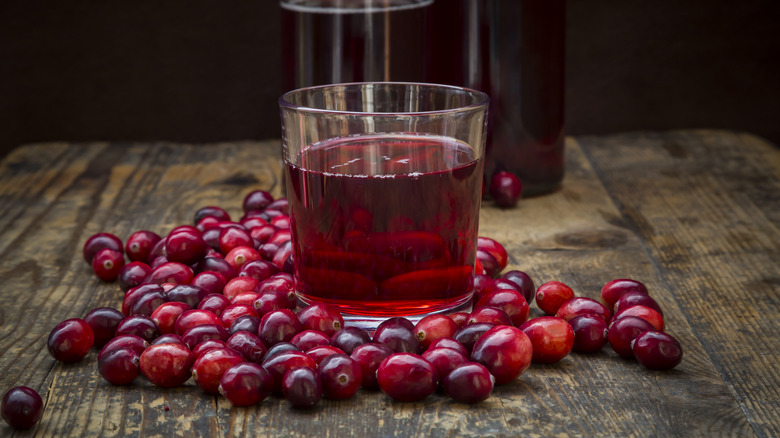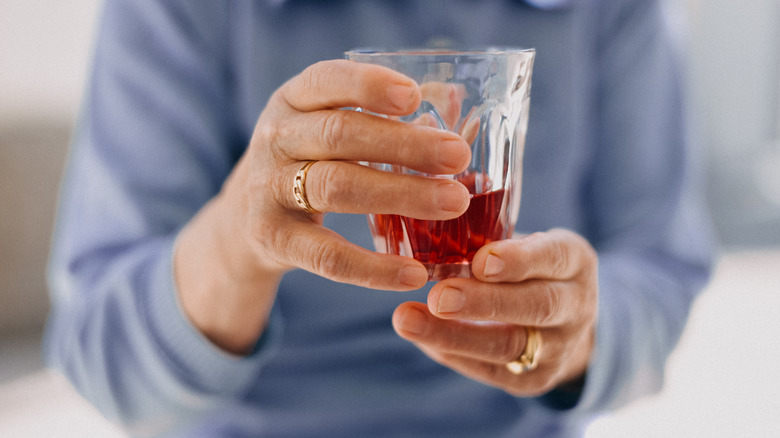What Happens To Your Body When You Drink Cranberry Juice Before Bed?
Cranberry juice provides that perfect mix of sweet and tart to wake up your taste buds in the morning. Ripe cranberries get their rich, red color from anthocyanins, which are powerful antioxidants that protect your cells from damage from free radicals. Let's not forget how cranberry juice might help prevent recurring urinary tract infections (UTIs).
Cranberries are also rich in melatonin, so it might seem logical to drink cranberry juice before bed to help you sleep. Not so, Registered Dietitian Samar Kullab, M.S. told Health Digest. "Drinking cranberry juice before bed is unlikely to improve your sleep and, for some, it might even disrupt it or reduce sleep quality due to its sugar content," she said. "If you choose to have some close to bedtime, I recommend opting for an unsweetened version to avoid a spike in blood sugar levels."
Ocean Spray's Pure Cranberry has just 9 grams of sugar compared to the 25 grams of sugar in Ocean Spray's Original Cranberry Juice Cocktail. While cranberry juice might not be the best choice for bedtime, you could drink cranberry juice earlier in the day for other health benefits.
Health benefits of cranberry juice
Kullab explains that cranberries protect you from recurring UTIs by preventing bacteria from sticking to your urinary tract walls. "However, to see potential benefits, you would likely need a supplement or cranberry extract, as drinking enough cranberry juice alone would require very large amounts," she said. Cranberry juice also can't treat existing UTIs.
Various compounds in cranberries have been found to have other health benefits, according to a 2022 review in Molecules. Polyphenols in cranberries may help lessen the risk of heart disease by lowering LDL cholesterol, preventing blood clots, and reducing blood pressure. Cranberries can help people manage diabetes by lowering blood sugar, inflammation, and oxidative stress after eating high-fat meals. Cranberries also protect your stomach against the Helicobacter pylori bacteria that can cause gastritis, ulcers, and stomach cancer. Phenolic extracts in cranberries also can slow the growth of bacteria such as E. coli and salmonella.
"Cranberry juice is a good source of vitamin C, which can help strengthen the immune system and protect against illnesses," Kullab said. The polyphenols, phenolic acids, isoprenoids, and oligosaccharides can also improve your gut microbiome.
Cranberry juice side effects
While a glass of cranberry juice provides many antioxidants to help prevent some conditions, drinking too much cranberry juice can have some side effects. Even though cranberry juice can ward off bacteria that can cause UTIs and bladder infections, cranberry juice can aggravate an overactive bladder. Cranberries are acidic, and their acidity can irritate the bladder. You might also get a stomach ache or diarrhea after drinking too much cranberry juice.
You also should avoid cranberry juice if you're prone to kidney stones. Calcium oxalate is one of the most common types of kidney stones, and eating foods high in oxalate can increase your risk of developing them. Cranberry juice is high in oxalates.
Check your medications to see if any interact with cranberry juice. Cranberries can affect how your liver processes certain medications, which could increase their side effects. Cholesterol-lowering statins like atorvastatin can break down more slowly if you take them with cranberry juice. Drinking cranberry juice while taking the blood thinner warfarin could increase your risk of bleeding.


